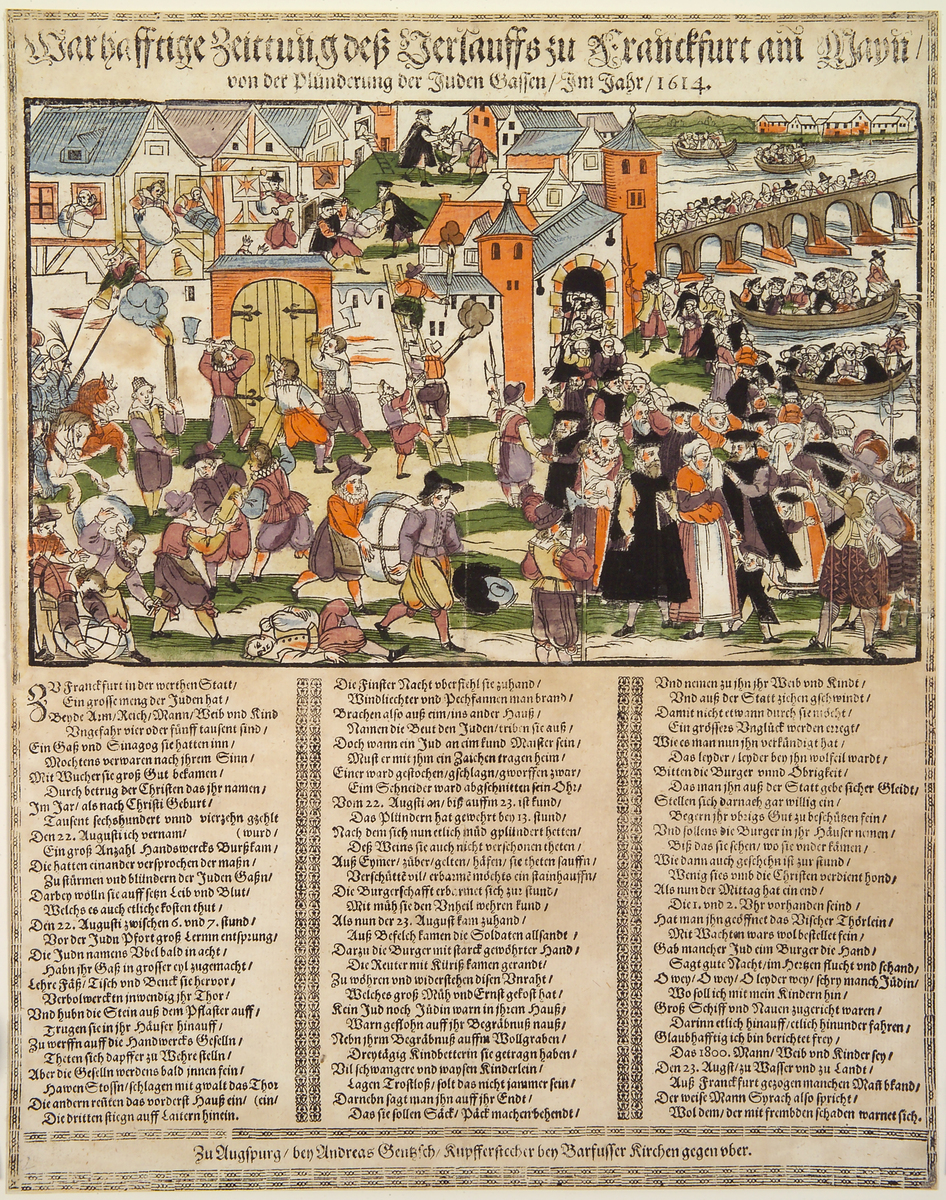Plundering of Frankfurt’s Jewish Quarter (1614)
Abstract
On August 22, 1614, the Jewish ghetto in Frankfurt was stormed by apprentice craftsmen who looted the homes of Jewish residents. The mob accused the Jews of dishonest business practices. The surviving Jews fled the city, and thereafter the Frankfurt ghetto was placed under special imperial protection. A translation of the broadsheet follows beneath the image.
Source
True Account of the Course of Events in Frankfurt on the Main during the Plundering of the Jewish Quarter in the Year 1614.
In Frankfurt, that noble city, there are a large number of Jews, poor, rich, men, women and children. There are about four or five thousand. They had their own quarter and synagogue, which they were allowed to run according to their preferences. Through usury they became very wealthy and by swindling the Christians they took what was theirs. In the year 1614 on the 22nd of August, I heard that a large number of journeymen came who had planned to storm and plunder the Jewish quarter not sparing bodies or lives, many of which were indeed taken. On the 22nd of August between 6 and 7 o’clock, there was a great clamor outside the gate to the Jewish quarter. The Jews soon realized the evil and quickly closed off their quarter, bringing empty barrels, tables, and benches to build a bulwark behind their gate. They picked up paving stones and carried them up to their houses in order to throw them at the apprentices. They bravely fought back, but the apprentices soon managed to get into the quarter, forcefully ramming, pushing, and beating down the gate. Others stormed the first house while a third group used ladders to climb across the wall.
The dark night increasingly overcame them, lanterns and cressets were lit. They broke into one house after the next, taking the spoils from the Jews and driving them away. But when a Jew managed to overpower someone, they went home bearing scars. One was stabbed, one was beaten, one even thrown out a window, a tailor had his ear cut off. It is said that from the 22nd of August until the 23rd the plundering lasted around 13 hours. Many had plundered so much that they got tired, and they did not spare the wine either. From buckets, tubs, pails and mugs they drank, spilling much. It was a sorry sight. The citizenry eventually took pity [on the Jews]. They had a hard time opposing the evil. When the 23rd of August arrived, orders were given to send in soldiers. In addition, the citizens showed a strong hand. Soldiers on horseback wearing armor quickly arrived in order to fight and beat back this mob, which took a lot of effort and determination. No Jew or Jewess remained in their houses, they had fled to their burial ground. Near to their burial ground at Wollgraben they carried a woman who had given birth three days earlier. Many pregnant women and orphans lay there hopeless, what a shame. Moreover, they were finally told to quickly pack up their belongings, take their women and children and quickly leave the city so that they would not cause an even greater misfortune. As they were being told this, they unfortunately agreed to it. They requested of the citizens and the government that they be given safe passage out of the city and then agreed to leave. They are eager to protect their remaining belongings and ask the citizens to keep them in their houses until they have found a place to stay, which is what happened. They have hardly earned this help from the Christians, however. Once noon had passed and it is 1 or 2 o’clock, the Uischler gate was opened for them. It was well guarded. Several of the Jews shook hands with a citizen, wishing them a good night while cursing them in their hearts. “Oy veh, oy veh,” several Jewesses cried, “where am I supposed to go with my children?” They made their way towards large ships and boats, in which many of them travel up and down the river. Indeed, I have been told that 1800 men, women and children left Frankfurt by boat and by land, including several well-known men. Thus the wise man Sirach spoke: Blessed be the man who heeds the warning of others’ misfortune.
Printed at Augsburg by Andreas Gentzsch, copper engraver located opposite the Barfusser Church.
Translation: Insa Kummer

Source: Broadsheet about the plundering of Frankfurt's Jewish quarter, colored woodcut by Andreas Gentzsch, Augsburg 1614. Frankfurt am Main, Historisches Musem, Inv.-Nr. N 42766; reprinted in Heiliges Römisches Reich Deutscher Nation. 962 bis 1806. Altes Reich und Neue Staaten 1495 bis 1806. Catalogue, edited by Hans Ottomeyer, Jutta Götzmann, and Ansgar Reiss. Dresden 2006, p. 391.
© Historisches Museum Frankfurt am Main. Photographer: Horst Ziegenfusz
Further Reading
Wolfgang Treue, Geschichte der jüdischen Gemeinde in der Reichsstadt Frankfurt am Main zu Beginn der Frühen Neuzeit 1520–1650 (as part of Germania Judaica IV) (forthcoming).